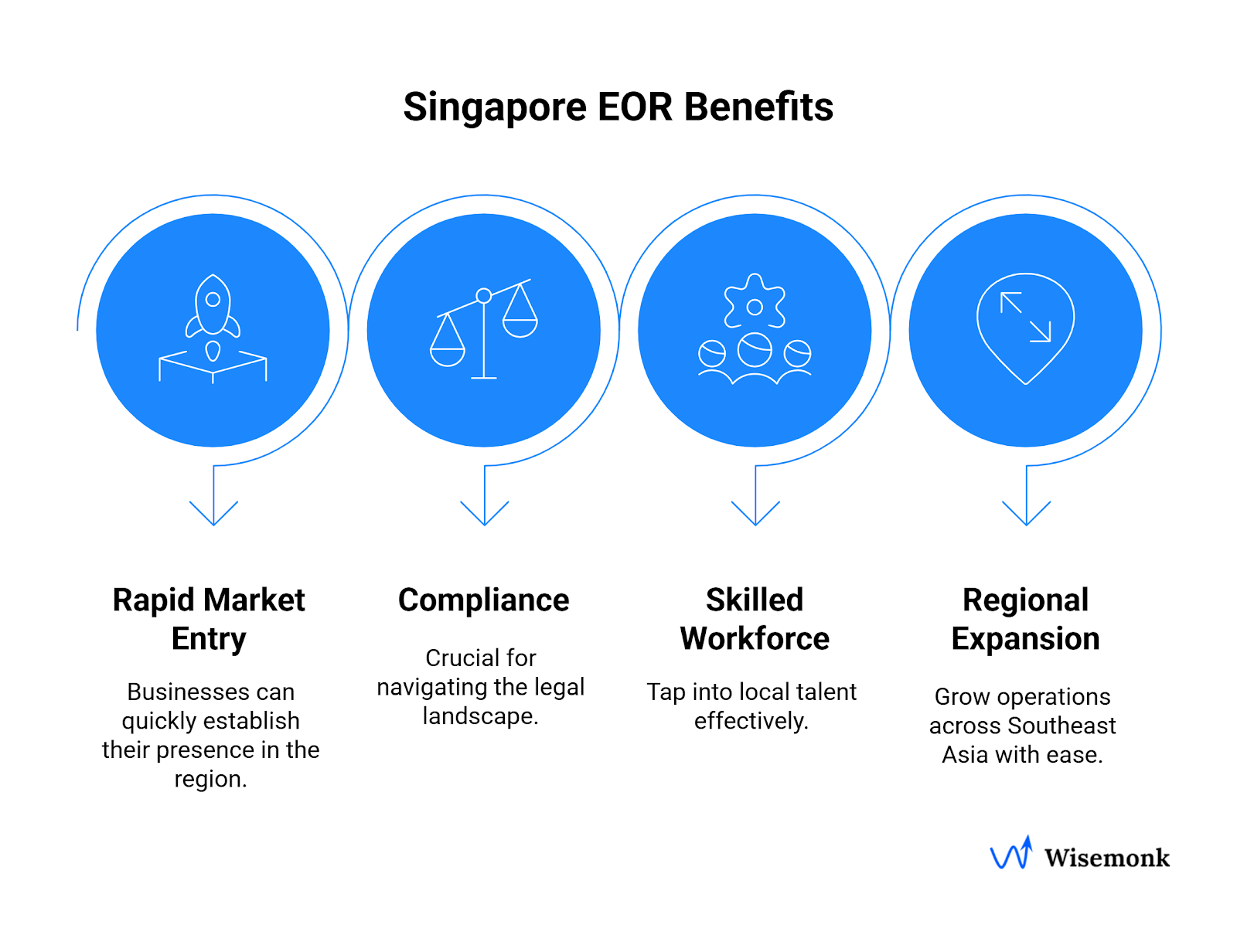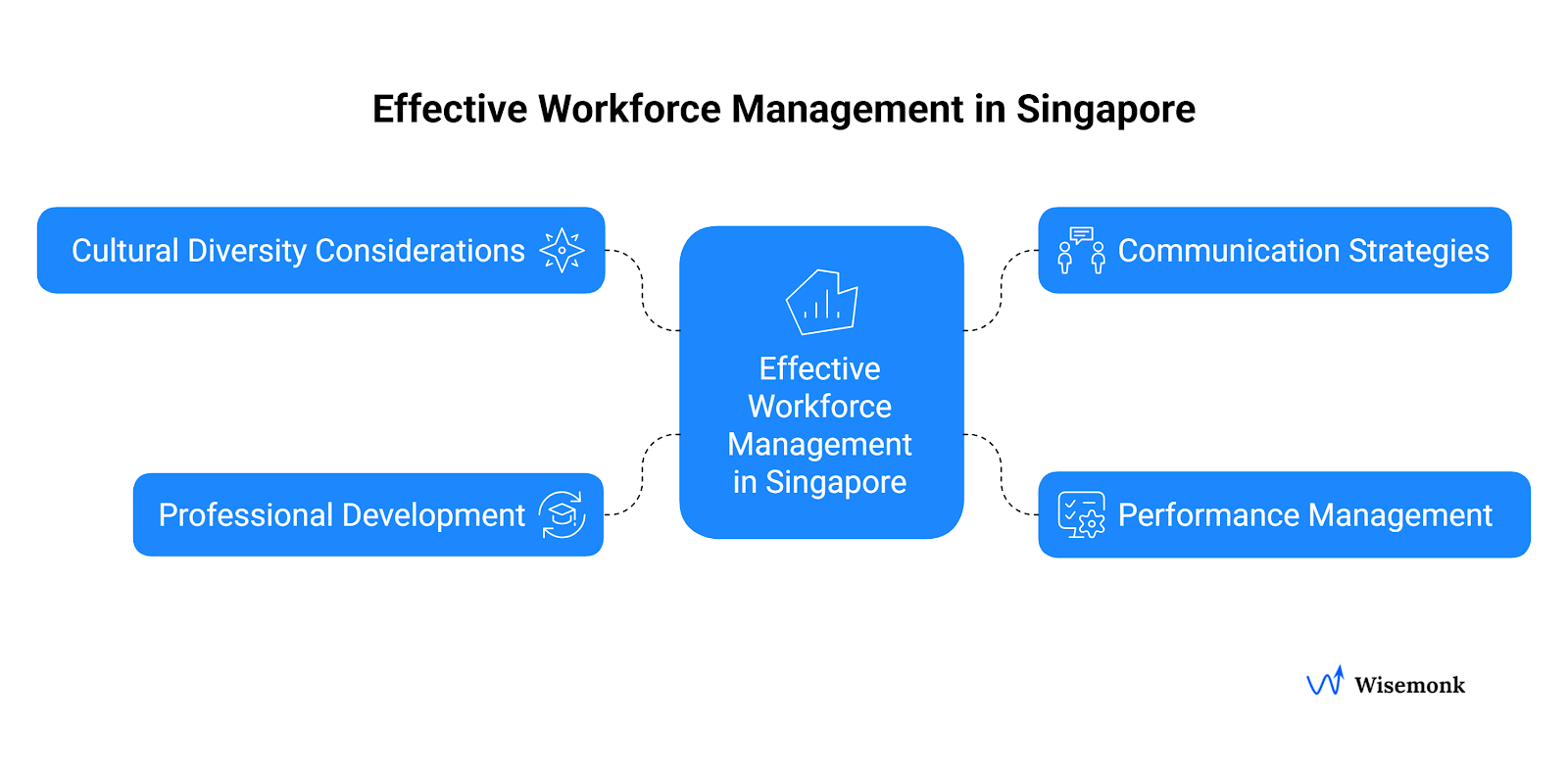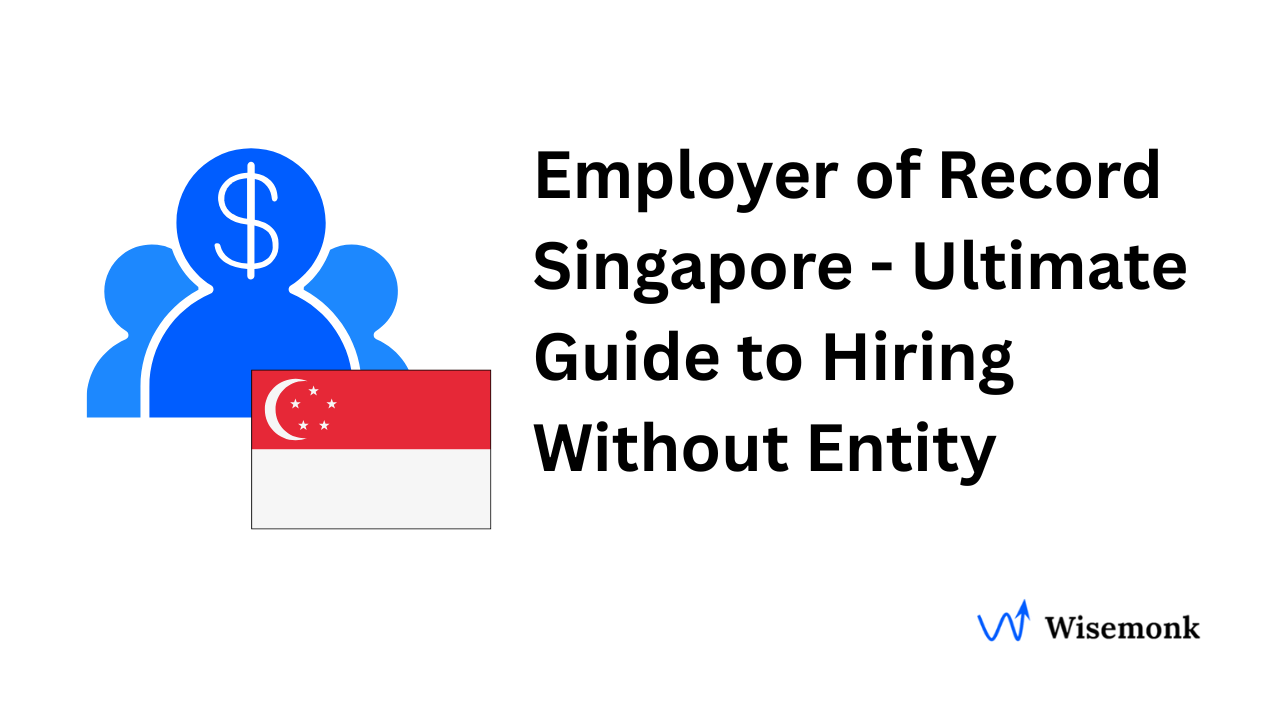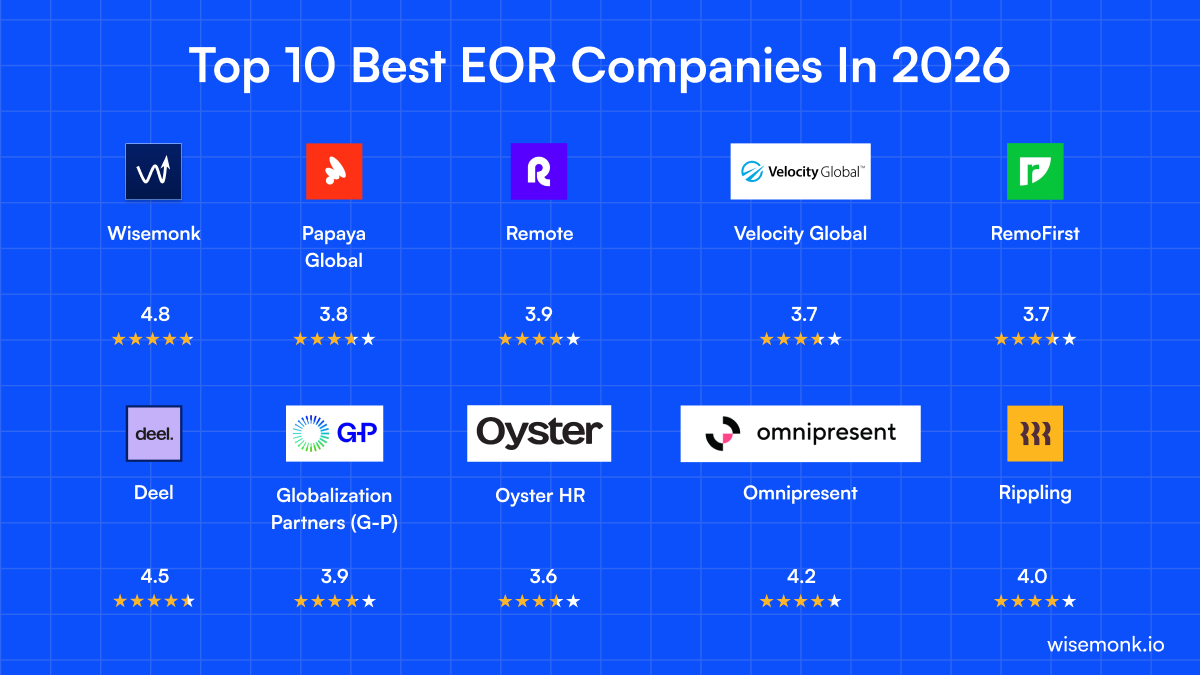Looking to expand in Asia with minimal risk and maximum efficiency? Singapore stands out as a leading global business hub, known for its stable economy, pro-business environment, and strategic location bridging East and West. Global employers frequently select Singapore for regional headquarters and expansion thanks to its robust infrastructure, transparent legal framework, and deep talent pool.
For firms seeking rapid, compliant entry, especially those new to Southeast Asia, an Employer of Record Singapore solution is often the most efficient way to hire employees, manage payroll, and test new markets. Now, let’s look at why EOR is the ideal launchpad for your success in Singapore.
What is the Singapore Employment Law Framework?[toc=Employment Law Framework]
Before diving into hiring or payroll, understanding Singapore’s employment law landscape is essential for compliance and risk management.
Singapore Employment Act Overview
The Singapore Employment Act is the primary legislation governing employment contracts, employee benefits, statutory entitlements, and termination rules. It covers both local and foreign employees, setting out legal employer responsibilities for areas like annual leave, notice periods, and overtime pay.
Ministry of Manpower (MOM) Regulations
The Ministry of Manpower (MOM) prescribes additional guidelines and oversees work visas (work passes), employment regulations, and workplace safety. MOM regulations reinforce standards for fair employment, anti-discrimination, and foreign worker quota management.
Central Provident Fund (CPF) Requirements
The Central Provident Fund (CPF) is a compulsory pension and social security system. Both employers and employees contribute to retirement savings, healthcare, and housing. Singapore employer of record partners handle all required CPF contributions, ensuring compliance and timely submissions.
Work Pass Regulations
Foreign employees must hold a valid work permit or employment pass authorized by MOM before starting work. Staying compliant with processing times, role specifications, and renewal requirements is non-negotiable for international employment in Singapore.
Now that the foundation is set, let’s discover how employer of record services simplify market entry and ongoing compliance.
What are the Key Benefits of Using Employer of Record in Singapore?[toc=Key Benefits of EOR]
Moving into a new country can be challenging, but Employer of Record services Singapore mitigate risk and accelerate business setup. Here's what makes an Employer of Record ideal in Singapore:

- Rapid Market Entry: Eliminate the need to incorporate a local entity. Onboard new employees and start operations within weeks.
- Full Legal Compliance: Experts in Singaporean employment laws manage intricate labor laws, payroll processing, CPF contributions, statutory benefits, and more.
- Access to Top Talent: Easily hire full-time employees, permanent residents, and even foreign employees, without local incorporation barriers.
- Regional Expansion Platform: Launch a base for Southeast Asia expansion while keeping labor regulations and record services in trusted hands.
An EOR service provider serves as your legal employer in Singapore, taking on all employment responsibilities, so you can focus on business growth.
How Do EORs Handle Payroll and CPF Compliance in Singapore?[toc=Payroll & Compliance]
Curious about how companies simplify payroll and CPF when hiring in Singapore? Here’s how a trusted employer of record (EOR) takes the guesswork out of Singapore’s payroll and provident fund requirements:
- CPF Contribution Rates: For employees aged 55 and below, total CPF is 37% (17% employer, 20% employee) of the employee's salary, with progressive reductions at older age bands.
- Monthly Submission Requirements: EORs process monthly salary payments, CPF contributions, and government submissions, always on time, as required by law.
- Income Tax Obligations: Manage employees’ income tax (IRAS), withholding taxes for foreign employees, and ensure alignment with Singapore’s tax regulations.
- Year-End Reporting: Prepare and file annual tax statements and CPF reports, along with benefits administration and payroll taxes, all in line with legal obligations.
Now that you know payroll and CPF basics, let’s find out what employee benefits your Singapore teams can expect.
What Employee Benefits Are Mandatory for Workers in Singapore?[toc=Employee Benefits]
Based on careful research of Singapore’s labor laws and statutory regulations, we can confirm that providing mandatory employee benefits is essential for retaining talent and ensuring legal compliance.
- Annual Leave: Minimum 7 to 14 days, based on tenure, as mandated by the Employment Act (Detailed leave structure in Singapore).
- Medical Benefits: Employers must reimburse medical expenses or provide coverage as part of health insurance and employee benefits packages.
- Maternity/Paternity Leave: Statutory paid leave entitlements apply for eligible Singapore employees, including government-paid maternity, paternity, and shared parental leave.
- Public Holidays: All Singapore employees are entitled to 11 official public holidays, either as paid leave or overtime pay for working on holidays.
EOR providers ensure all statutory and negotiated benefits are administered compliantly and aligned with local labor laws.
What Does the Hiring and Onboarding Process Look Like via Employer of Record?[toc=Hiring & Onboarding]
Drawing from our work as an EOR helping numerous international companies, we’ve outlined a streamlined hiring and onboarding process that helps you avoid common pitfalls and comply with local regulations.
- Required Employee Documents: Collect NRIC or passport, education credentials, bank details, and proof of work eligibility or approved work passes.
- Background Screening: Standard checks may include employment history, references, professional qualifications, and, for foreign employees, validation of right to work.
- Onboarding Timeline: With an EOR, onboarding typically takes 2–4 weeks, depending on work permit approvals and vetting.
- Integration Support: EORs offer dedicated account management, ensuring seamless integration, payroll setup, and orientation for all new employees.
How Can You Effectively Manage Singapore Workforce?[toc=Workforce Management]
In our experience managing diverse global workforces, we’ve seen that cultural sensitivity, effective communication, and robust performance management practices are key to business success.

- Cultural Diversity Considerations: Embrace workforce diversity. Singapore is a multicultural labor market where inclusion drives success.
- Communication Strategies: Prioritize clear, respectful, and culturally sensitive communication to engage Singapore employees and manage teams.
- Performance Management: EORs support development programs, transparent feedback processes, and regular performance reviews.
- Professional Development: Foster continuous learning and upskilling; many EOR service providers can help manage training benefits administration.
With an EOR, you maintain day-to-day management while your EOR partner handles all local employment laws and HR compliance.
What Are the Costs and ROI of Employer of Record Services in Singapore?[toc=Costs & ROI]
From financial analyses and industry benchmarks, we know that choosing the right EOR provider can deliver significant cost savings, risk mitigation, and a better return on investment.
- CPF and Tax Implications: EORs ensure proper filing of CPF and payroll taxes, providing cost savings by avoiding penalties.
- Benefits & Budgeting: EORs build competitive benefits packages using their scale for best rates.
- ROI Calculations: Businesses see savings in business expenses, reduced risk management costs, and faster market access.
Here's a quick comparison between using an EOR service provider vs setting up a legal entity:
How Does an EOR Keep You Aligned with MOM and Statutory Rules?[toc=Regulatory Compliance]
Based on our extensive compliance expertise, an EOR plays a significant role in helping companies stay aligned with MOM regulations, audit requirements, and penalty avoidance strategies.
- MOM Compliance: Handle all Ministry of Manpower audits, quota tracking, and work pass regulations.
- Work Pass Quota and Levy: Monitor local labor/S-pass quotas and pay levies as required for foreign workers.
- Audit Preparation: Ensure accurate, standardized record services and audit trails for legal reviews.
- Penalty Avoidance: EORs proactively manage compliance deadlines to avoid fines for late payroll, CPF contributions, or tax filings.
Conclusion[toc=Conclusion]
Having supported many global employers expanding in their business, we attest that the EOR model provides an unmatched combination of speed, compliance, and operational efficiency. With an EOR:
- Expand quickly into Singapore and Southeast Asia without the administrative burden of creating a local entity.
- Stay fully compliant with evolving Singapore employment act rules and labor regulations.
- Access top local and international talent while reducing hiring risk.
- Streamline payroll, benefits, and compliance with confidence.
Strategic Next Steps:
- Evaluate your employer of record Singapore options.
- Define the job titles and employee types you wish to hire.
- Align employment contracts and benefits administration with statutory requirements.
- Start your Singapore expansion with an EOR for a risk-free, compliant launch.
Ready to expand your global business quickly and compliantly? Partner with Wisemonk’s Employer of Record services to effortlessly manage hiring, payroll, and compliance, so you can focus on growing your business with confidence.
Frequently asked questions
What are the different types of work passes available?
Singapore offers various work permits, including the Employment Pass (for professionals), S Pass (for mid-level skilled staff), and Work Permit (for semi-skilled workers), all managed by the Ministry of Manpower.
How does CPF work for foreign employees?
CPF contributions are generally required for Singapore citizens and permanent residents. Foreign employees on work passes usually do not contribute to CPF, but must comply with other employment laws and statutory benefits.
What are the costs associated with Singapore EOR?
EOR services use a fixed monthly fee per employee, covering payroll processing, benefits administration, compliance, and risk management, eliminating incorporation and variable admin costs.
How long does the work pass application process take?
It typically takes 3–8 weeks from job offer to work pass approval, with employers/EOR partners overseeing every step.
Can EOR help with regional expansion from Singapore?
Yes, Singapore’s position as a business hub makes it the natural headquarters for regional hiring and payroll, with EOR providers offering scalable, multi-country solutions for global employers.
What is an example of an employment record?
Examples include a record of employment (ROE), payslips, employment contracts, or tax documents that detail an employee’s work history, earnings, and job status.
How to verify foreign employment?
Foreign employment can be verified by contacting previous employers, checking official employment records, requesting reference letters, or using background verification services.

.png)
%20(1).webp)
